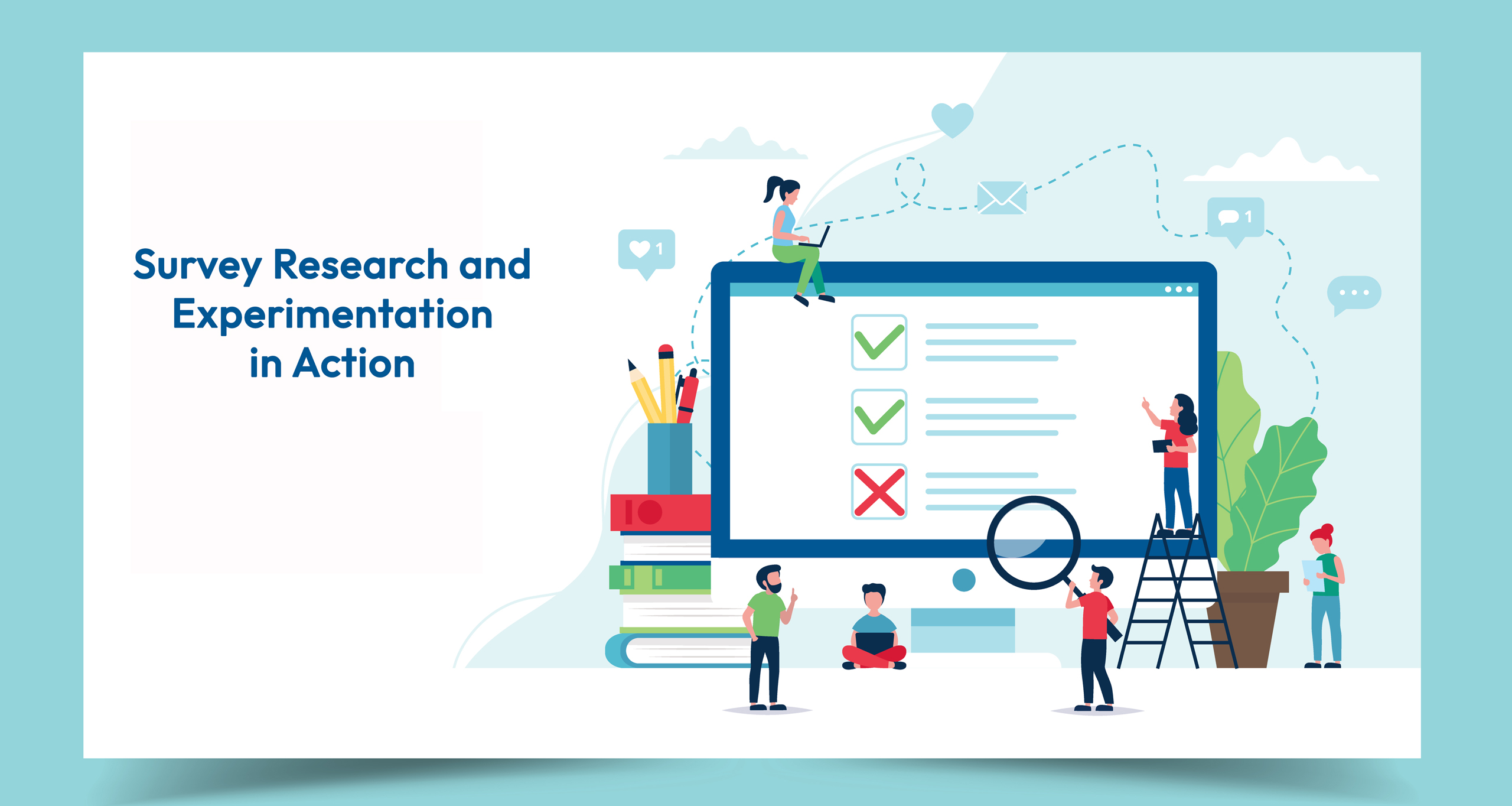Profile of the Instructor

Prof (Dr). Ashish Singh
Prof. Ashish Singh is an Associate Professor in the School of Management at IIT Bombay. His research interest includes economics of distribution, discrimination, exclusion and development as well as public health (with focus on maternal and child health). He is an academic editor for PLOS Global Public Health; associate editor for International Journal for Equity in Health; and section editor for Archives of Public Health. He has trained more than 300 hundred scholars, researchers and faculty members across the globe in Survey Research and Experimentation over the last 10 years.
Module 1 : Day 1
Module Name : Introduction
Concepts Covered :
- Need for Research
- The scientific method
- Determinants of conducting Research
- Types of Research Designs
- Problem definition
Learning Outcomes :
Good understanding of Research process, basic Research Designs and the determinants of Research.
Module 2 : Day 2
Module Name : Theory, Research Concepts, Propositions & Hypotheses, Measurement and Scaling Concepts, Reliability and Validity
Concepts Covered :
- Theory building (deductive and inductive)
- Abstract and empirical level
- Measurement and scaling
- Summated scales and reverse coding
- Reliability, validity and sensitivity
- Pragmatic ways to establish reliability and validity
Learning Outcomes :
Good understanding of theory building process and pragmatic understanding of measurement and scaling.
Module 3 : Day 3
Module Name : Attitude Measurement and Survey Research
Concepts Covered :
- Attitude
- Techniques for measuring attitudes
- Types of scales used in social science research and their demonstration using attitude measurement
- Survey Research and errors in Survey Research
- Survey Research Methods
- Response rates and practical ways to increase response rate
Learning Outcomes :
Good understanding of measurement of various components of attitude using various scales and practical knowledge of survey research along with the challenges faced in Survey Research.
Module 4 : Day 4
Module Name : Design of Instruments, Sampling Designs, Sampling Procedures and Data entry, coding, cleaning and editing
Concepts Covered :
- Design of Instruments and decisions in instrument design
- Sampling Designs (probability/non-probability; single stage/multistage etc.)
- Sampling Procedures estimating sample size (if time permits – data entry, coding, cleaning and editing)
Learning Outcomes :
Good (and practical) understanding of design of instruments and sampling as well as estimation of sample size.
Module 5 : Day 5
Module Name : Reflection of concepts Covered & Doubts Clarifications
Time for reflection and additional questions (doubts etc.) for the topics covered in the first 4 days and further discussion on take home assignments
Module 6 : Day 6
Module Name : Hypothesis Testing and Data Analysis Methods for Survey Research
Concepts Covered :
- Types of statistical analysis
- Types of hypotheses
- Hypothesis testing process
- Significance level and p-value as well as their inter-play
- Types of errors and methods used in data analysis
Learning Outcomes :
Good (and practical) understanding of statistical analysis, hypothesis testing, and drawing inferences.
Module 7 : Day 7
Module Name : Experimental Research: Causality, Demand Characteristics, Control, Experimental Validity and Introduction to Various Experimental Designs – I
Concepts Covered :
- Creating an experiment
- Designing an experiment (important design elements)
- Cause, effect and experimental confound
- Demand characteristics
- Practical experimental design issues
- Issues of experimental validity
- Types of experimental designs(true; quasi and non-experimental as well as time-series) (pretest-posttest control group; posttest only control group; non-equivalent control group, multiple treatment and complex designs; difference in difference etc.)
Learning Outcomes :
Good and practical understanding of experiments and experimental designs.
Module 8 : Day 8
Module Name : Experimental Research: Causality, Demand Characteristics, Control, Experimental Validity and Introduction to Various Experimental Designs – II + Feedback and reflection
Concepts Covered :
- Creating an experiment
- designing an experiment (important design elements)
- Cause, effect and experimental confound
- Demand characteristics
- Practical experimental design issues
- Issues of experimental validity
- Types of experimental designs (true; quasi and non-experimental as well as time-series) (pretest-posttest control group; posttest only control group; non-equivalent control group, multiple treatment and complex designs; difference in difference etc.)
Learning Outcomes :
Good and practical understanding of experiments and experimental designs
Intended Audience & Eligibility
Intended Audience :
Master’s Students, PhD Scholars, Faculty members and Researchers from field-based organizations involved in Social Science research as well as public health.
Eligibility :
Should have completed Bachelors.
Assignment & Certification Criteria
Assignment :
Every day take home assignments with deadlines will be conducted.
Certification :
Certification will be based on the Assignment Score and the Attendance percentage.



Pramit chhetri –
This has been one of the most fulfilling courses I have ever taken. I gained a wealth of knowledge and insights throughout the program. I am deeply grateful to Prof. Ashish Singh for his exceptional teaching approach—his ability to simplify complex concepts made the learning experience both effective and enjoyable. I highly recommend the course “Survey Research and Experimentation in Action” to postgraduate students, research scholars, and anyone passionate about exploring deeper into the field of research.
Babji Malineni (verified owner) –
Easy to understand
Pulkita Jain –
I enjoyed the course—it clarified what to consider when designing questionnaires and highlighted practical challenges like bias, reliability, and missing data with simpler examples that aren’t easily found in textbooks.
Rahul Aggarwal (verified owner) –
The faculty made it very easy for participants from various disciplines as well as different roles (Academics/ Industry) to understand and contextualize various aspects. Will highly recommend this program for anyone/ research scholar in the area of survey research.
SHOBHANAM KRISHNA (verified owner) –
The course on Survey Research and Experimentation in Action was extremely well-conducted and insightful. Prof. Ashish Singh explained the concepts with great clarity, and the sessions were thoughtfully structured to build a strong foundation in both survey methods and experimentation.
I found the experimentation component particularly engaging and intellectually stimulating. It has sparked my interest in exploring more advanced aspects of survey design and experimental research.
I am truly grateful for the opportunity to be part of this course and have learned a great deal throughout. Thank you once again for such a valuable learning experience.
Warm Regards
Shobhanam Krishna
Research Scholar
IIM Shillong, Shillong, India
RAVI KUDTARKAR (verified owner) –
The workshop was very much informative and insightful. It is recommended to read prior the research methodology, brush up your understanding and attend the session. As the session is predominantly discussion based prior reading will help you to gain more from the sessions. The resource person is motivating and encouraging. He will probe, to understand the level of comprehension and gives the gist of the concept in simple language. For the nascent researchers and scholars these sessions are very much beneficial. Kindly register for greater insights
Shivam Dutta (verified owner) –
Good detailed course, covering basic concepts in all its form.